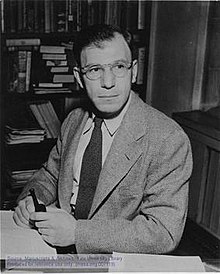
Back برنارد برودي (أستاذ جامعي) Arabic برنارد برودى ARZ Bernard Brodie Welsh Bernard Brodie (Militärstratege) German Bernard Brodie French ברנארד ברודי HE バーナード・ブローディ (軍事戦略家) Japanese 伯纳德·布罗迪 (军事战略家) Chinese
This article needs additional citations for verification. (February 2013) |
Bernard Brodie | |
|---|---|
 | |
| Born | May 20, 1910 Chicago, Illinois, U.S. |
| Died | November 24, 1978 (aged 68) California, U.S. |
| Known for | The Absolute Weapon: Atomic Power and World Order |
| Spouse | |
| Academic background | |
| Alma mater | University of Chicago Ph.B, Ph.D |
| Thesis | Sea Power in the Machine Age (1940) |
| Doctoral advisor | Jacob Viner |
| Academic work | |
| Discipline | Military strategist |
| Sub-discipline | Nuclear strategy |
| Institutions | |
Bernard Brodie (May 20, 1910 – November 24, 1978) was an American military strategist well known for establishing the basics of nuclear strategy.[1] Known as "the American Clausewitz," and "the original nuclear strategist," he was an initial architect of nuclear deterrence strategy and tried to ascertain the role and value of nuclear weapons after their creation.
Brodie was initially a strong supporter of the concept of escalating responses; he promoted the view that a war in Europe would be started with conventional forces and escalate to nuclear only if and when necessary. After a meeting with French counterparts in 1960, he came to espouse a very different policy, one based purely on nuclear deterrence with the stated position that the US would use nuclear arms at the first instance of hostilities of any sort. Brodie felt that anything short of this seriously eroded the concept of deterrence and might lead to situations where one side might enter hostilities believing it could remain non-nuclear. This change in policy made Brodie increasingly at odds with his contemporaries.